|
THE CROSSING AT FREDERICKSBURG
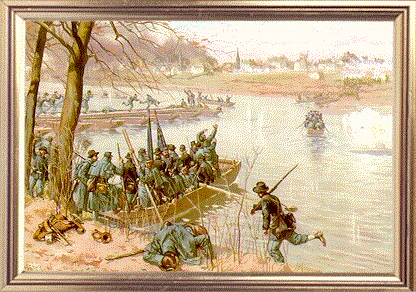
Troops crossing the river under fire on Dec. 11, 1862
Inspired by the crossing of the
Rappahannock River on Dec. 11, 1862 by three Union regiments while
under fire from Confederates in Fredericksburg, Va. Written by George
Henry Bokker, a poet, dramatist, and later United States Minister to
Russia and Turkey. The poem was inspired in part by an interview by Bokker
with Oliver Wendell
Holmes, Jr. (Holmes himself did not participate in the battle.) The
dramatic crossing was called by one soldier "the forlorn hope;
they said the country would never forget us". This web page developer's
great- great uncle Cpl. Anton Steffens
was killed in this street fighting.
They leaped on
the rocking shallops,
Ten offered where one could go,
The breeze was
alive with laughter
Till the boatmen began to
row.
"How many? I
judge four hundred;"
"Who are they? I know to a man;"
Our own
Nineteenth and Twentieth,
And the Seventh
Michigan.
Then the shore
where the rebels harbored
Was fringed with a gush of flame,
And
buzzing like bees o'er water
The swarms of their bullets
came.
In silence, how dread and
solemn!
With courage, how grand and true!
Steadily,
steadily onward
The line of shallops drew.
Not a whisper!
Each man was conscious
He stood in sight of death!
So he bowed to
the awful presence,
And treasured his living
breath,
'Twixt death in
the air above them
And death in the waves below,
Through balls and
grape and shrapnell
They neared-my God! how
slow!
And many a brave
stout fellow,
Who sprang in the boats with mirth,
Ere they made that
fateful crossing
Was a load of lifeless earth.
And many a brave
stout fellow,
Whose limbs with strength with rife,
Was torn and
crushed and shattered--
A helpless wreck for
life.
Cheer after cheer
we sent them,
As only armies can,
Cheer for old
Massachusetts!
Cheers for young Michigan!
They formed a
line of battle,
Not a man was out of place!
Then with level steel
they hurled them,
Straight in the rebel's face.
And thus they
crossed the river,
Hear me, man, from rear to van;
Three cheers for
old Massachusetts!
And three more for young
Michigan.
--Source:
Miller and Mooney, "The Civil War-The Nantucket Experience" (Wesco
Publishing Co., 1994)
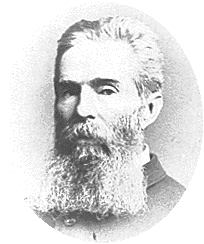 |
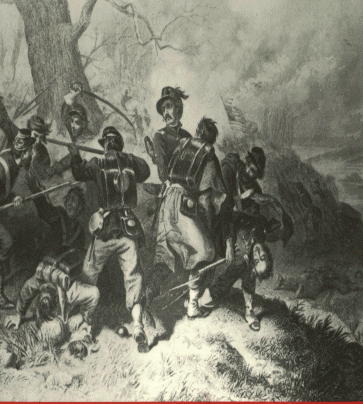 |
| Author Herman
Melville-- |
-Rescuing the body of Gen. Baker at Ball's
Bluff |
One noonday, at
the window in the town,
I saw a sight--saddest that eyes can
see--
Young soldiers marching lustily
Unto the wars,
With fifes,
and flags in mottoed pagentry;
While all the porches, walks, and doors
Were rich with ladies cheering royally.
They moved like
Juny morning on the wave,
Their hearts were fresh as clover in its prime
(It was the breezy summer time),
Life throbbed so strong,
How should they dream that Death in a rosy
Clime
Would come to
thin their shining throng?
Youth feels immortal, like the Gods
sublime.
Weeks passed; and
at the window, leaving bed,
By night I mused, of easeful sleep bereft,
On those brave boys (Ah War! Thy theft);
Some marching feet
Found pause at last by cliffs Potomac cleft;
Wakeful I mused, while
in the street
Far footfalls died away till none were
left.
"BALL'S
BLUFF" by Brigadier General Frederick Lander
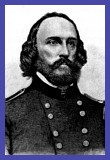
Written after the battle, on
hearing a Confederate officer's quote that "fewer of the Massachusetts
officers would have been killed [at Ball's Bluff], had they not been too
proud to surrender". This poem specifically is about the 20th Mass.,
naming officers such as Revere and Holmes.
This
composition by Brigadier General Frederick Lander really seems to
capture and portray the emotion felt by those who fought at Ball's
Bluff. The poem flows almost like a
mournful
ballad and reads very lyrically, almost as if one was listening to a
Keith Sweat song.
The last stanza's question,
"Has Sparta more?" was answered by the end of the Civil War, almost four
years later; the 20th Massachusetts suffered the most casualties of any
Massachusetts regiment.
Aye, deem us proud, for
we are more
Than proud of all our mighty dead;
Proud of the bleak
and rock-bound shore,
A crowned oppressor cannot
tread.
Proud of each rock, and
wood, and glen;
Of every river, lake and plain;
Proud of the calm
and earnest men
Who claim the right and the will to
reign.
Proud of the men who
gave us birth,
Who battled with the stormy wave
To sweep the red man
from the earth,
And build their homes upon their
grave.
Proud of the holy summer
morn
They traced in blood upon its sod;
The rights of freemen yet
unborn;
Proud of their language and their God.
Proud that beneath our
proudest dome
And round the cottage-cradled hearth
There is a
welcome and a home
For every stricken race on
earth.
Proud that yon slowly
sinking sun
Saw drowning lips grow white in prayer,
O'er such brief
acts of duty done,
As honor gathers from
despair.
Pride, 't is our
watchword; "clear the boats"
"Holmes, Putnam, Bartlett,
Peirson-Here"
And while this crazy wherry floats
"Let's save our
wounded", cries Revere.
Old State-some souls are
rudely sped-
This record for thy Twentieth Corps-
Imprisoned,
wounded, dying, dead,
It only asks, "Has Sparta more?"
THE MASSACHUSETTS LINE
by Rev. R.T.S.
Lowell
Still first, as
long and long ago,
Let Massachusetts
muster;
Give her the post
right next to the foe;
Be sure that you
may trust her.
She was the first
to give her blood
For freedom and
for honor;
She trod her soul
to crimson mud;
God' s Blessing
be Upon her!
She never
faltered for the right,
Nor ever will
hereafter:
Fling up her name
with all your might;
Shake roof-tree
and shake rafter.
But of old deeds
she need not brag,---
How she broke
sword and fetter:
Fling out again
the old striped flag;
She'll do yet
more and better.
In peace, her
sails fleck all the seas;
Her mills shake
every river;
And where are
scenes so fair as these
God and her true
hand give her?
In war, her claim
who seek to rob;
All others come
in later;
It is hers first
to front the Mob,
The Tyrant, and
the Traitor.
God Bless, God
Bless, the glorious State!
Let her have way
to battle!
She'll go where
batteries clash with fate,
Or where thick
rifles rattle.
Give her the
Right, and let her try;
And then who can
may press her;
She'll go
straight on, or she will die;
God Bless her,
and God Bless her!
The legendary street fighting of the
20th Mass. occurred Dec. 11, 1862 in Fredericksburg. Two days later, the
Regiment suffered more horrendous casualties in the famous charge up
Marye's Heights. Leander F. Alley, a Nantucket native and
close friend of Henry Abbott, was killed instantly Dec. 13 by a bullet
through his left eye. A short poem in his honor was written by Phebe
Hanaford, a Nantucket minister, the first female minister in New England.
THE DEATH OF
LIEUTENANT LEANDER ALLEY
Brave and true-hearted; in his country's cause,
His life he hath
lain down;
Noble the deed, and History's page shall tell,
He wore a
martyr's crown.
Aye, woven with
the amaranthine flowers.
Which bloom where angels dwell,
While
patriot's hearts beside his grave may plant,
In love the
asphodel.
God comfort those
who mourn his early loss,
And wipe their tears away,
With thoughts
of meeting him again at last.
Where beams th' eternal
day.
Where warlike
deeds, for aye are known no more,
And peace rules in each heart,
And
sainted heroes loving friends shall greet
No more-oh, joy!-to
part.
Beneath the green
sods of his native isle,
His honored dust shall rest-
His memory
livest, as a patriot true,
In many a grateful
breast.
Write now the
name of Alley on thy list,
Oh Fame!and write it high:-
Nantucket's
brave, heroic sons may fall,
Their names shall never
die.
Nantucket native Josiah
Fitch Murphey "caught the fever" and volunteered in August 1862. In his
memoirs he noted that when arriving in Boston by steamer, "we were marched
to headquarters to the tune of the Raw Recruit which ran thus":
I'm a raw recruit with a bran[d] new suit,
One hundred
dollars bounty,
I'm going down to Washington,
To fight for
Nantucket County.
--Source: Miller and
Mooney, The Civil War: The Nantucket Experience
SOLDIER BURIED ON
THE BATTLEFIELD
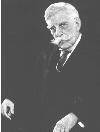
A poem quoted by Oliver Wendell Holmes,
Jr. in a Memorial Day speech at
Harvard in 1895 entitled "The Soldier's Faith". (Theodore Roosevelt
admired that 1895
speech so much that as President he nominated Holmes for the US
Supreme Court.) Holmes in the 1895 speech spoke
of "part of the soldier's faith: Having known great things, to be content
with silence." He cited this poem as "a little song sung by a warlike
people on the Danube, which seemed to me fit for a soldier's last word...a
song of the sword in its scabbard, a song of oblivion and peace. A Soldier
has been buried on the battlefield." (A portion of this poem was recited
in the 1950 Hollywood movie about Holmes, "The
Magnificent Yankee.")
And when the wind in the tree-tops
roared,
The soldier asked from the deep dark
grave:
"Did the banner flutter
then?"
"Not so, my hero," the wind
replied.
"The fight is done, but the banner won,
Thy comrades of old have borne it hence,
Have borne it in triumph
hence."
Then the soldier spake from the deep dark
grave:
"I am content"
Then he heareth the lovers laughing pass,
and the soldier asks once
more:
"Are these not the voices of them that love,
That love--and remember me?"
"Not
so, my hero," the lovers say,
"We are those that
remember not;
For the spring has come and the earth
has smiled,
And the dead must be
forgot."
Then the soldier spake from the deep dark
grave:
"I am
content."
|